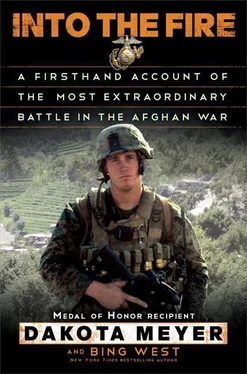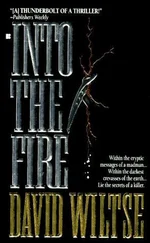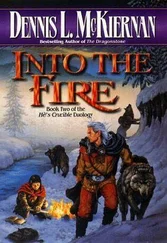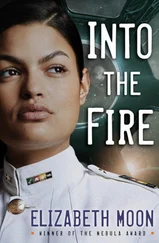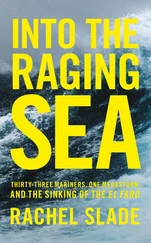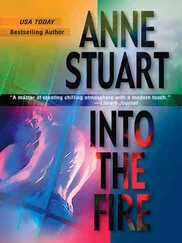“Man your .50-cal!” I yelled.
“We’re logistics,” came the muffled reply. “We don’t fight.”
Some supply guys can’t wait to get into the action, but not this gang. I wasn’t worried, though. Wild Man Kerr would soon have air on station.
Bodies were scattered all over the road, all civilians. Lying facedown next to me alongside the Army truck was a skinny teenager in a T-shirt, bleeding from shrapnel in his chest and left arm. With the American soldiers and Askars putting hundreds of rounds downrange, my M4 wasn’t needed. I slung my rifle, wrapped a tourniquet around the kid’s arm, picked him up, and carried him back to my Humvee. He had a tracheal deviation and a sucking chest wound. I plunged a decompression dart into the pleural cavity below his third rib and foul-smelling air hissed out his lung. As I was doing this, Specialist Charles Tomeo, the medic in Kerr’s platoon, ran up and shoved a plastic tube up the kid’s nose to open the airway.
He was a pathetic sight, sprawled on his back in his filthy brown shorts, an orange-tipped needle protruding from above his heart and a plastic stopper shoved up his left nostril. He didn’t weigh as much as I ate in a day. His hands and feet were uglier than dirt from his efforts to crawl out of the line of fire. He wasn’t old enough to grow a beard, but he had a full shock of black hair. Not a bad-looking kid. Once he was cleaned up at the aid station and had some ice cream, he’d be OK.
I felt good. In fact, I was pumped. I had applied dozens of tourniquets, but this was the first time I had smelled death hiss out. I had saved a human being, a poor, scrawny kid eking out a living by driving a banged-up truck past known ambush sites. Would he eventually join the Taliban and betray an American convoy? I had no idea. Sure, some of the villagers at Ganjigal had been real pricks. But why should I hold that against this kid?
I ran back down the road, hoisted up another wounded truck driver, and carried him back. Then I stopped to check on the skinny kid. I wanted to pat him on the shoulder to make myself feel good for my supposedly wonderful deed. Only he was dead. He had bled to death from the wound to his left arm. The crew in the Army truck had let him bleed out, not five feet away, because he was an Afghan and they were afraid. Damn it!
I went back to the wreckage and carried another truck driver back to our truck, where Tomeo bandaged him up. We placed the two wounded in our two trucks, and I put the kid’s body on the hood.
When I got back to the messed-up trucks, the enemy fire had slackened because Kerr was directing a Kiowa helicopter overhead. The Afghan drivers were huddled together in a ditch by the river. The ambush had been sprung about ninety minutes earlier. By now they had pissed themselves dry and had nowhere to go. I banged my rifle butt on the Army truck, yelling to the soldiers to open up.
“At least give me some water for those poor bastards!” I shouted.
A sheepish medic got out of the truck with several bottles of water and his medpack and ran over to the ditch. I knelt there, looking at the mud bloodstained from the kid, right beside the truck door.
I banged on the steel door again. It opened a crack.
“Fuck you!” I shouted at the captain inside.
I had placed a firecracker up my ass. I figured the shocked captain would light the fuse as soon as we got back to Monti. Don’t ask me why I did it.
By now, Kerr was directing rockets from the Kiowas to provide aiming points for an F-15 and was gleefully bombing the slopes. But we had to unsnarl the traffic mess to get the Army convoy—and my newest buddy, the captain—out of there. Capt. Bryant was yelling at the Afghan drivers to get back in whatever trucks would move. They were looking at him as if he were crazy. Bryant then came up with a brilliant idea.
“Hey, Meyer,” he yelled, “get behind the wheel of that big truck, drive it to the edge of the river, and hop out! When they see that, they’ll move the others.”
I liked Paco Bryant, but there was no way in hell that was happening.
“No, I’m not doing that.”
“Why not?”
“Because I’ll drown.”
“Okay, put a rock on the gas pedal and hop out.”
“No. How about you get in the truck and I’ll watch?”
He thought for a moment.
“You got a point,” he said. “Get one of those drivers to do it.”
I crawled over to a driver and threatened him with my rifle, pointing at the truck. We were still taking some light incoming. He just gestured for me to shoot him, as he preferred that to drowning. I laughed and he smiled back.
So we waited until a big wrecker arrived from Monti that quickly shoved aside the smoking wrecks. That still left a U.S. MRAP stuck in a ditch. Devine and I watched as a soldier hopped down from the wrecker and casually attached chains to the MRAP. We both liked this soldier, a hard worker who grumbled about how roughly grunts treated his beloved trucks.
“Better stay under cover, bro,” Devine said.
Instead, the mechanic, with no armor, stood on the road and slowly lit a cigarette.
“No biggie, Sergeant, I got this.”
Cigarette dangling from his lip, he signaled to the wrecker with both hands. Mr. Cool from a Camel ad. Very smooth, very much in charge—and very exposed.
Crack!
“I’m hit! I’m hit!”
Mr. Cool was down. We rushed him into the ditch and cut open his right trouser. He’d been drilled through the thigh. The bullet had passed through like a sizzling branding iron.
“Son of a bitch!” he screamed. “Son of a bitch!”
Understandable statement. The pain truly burned and Mr. Cool was definitely hurting. The bullet, though, had missed the femoral artery. A quick tourniquet, a fifteen-minute ride, and he’d be tucked inside clean white sheets, soon on his way to Germany and strawberry ice cream.
At the moment, though, he didn’t see the upside. Instead, he was screaming, convinced he was dying. Gunny Devine started to giggle, and I broke out in short snorts. Kerr ran over, took one look at the wound, and hooted.
We weren’t heartless. If he had been dying, we would have promised him he was going to live.
As the traffic jam was sorted out, Col. Yoo and I walked back to our Humvee. The dead kid lay on the hood and rather than ride to base with a corpse between us, we wedged the body in the trunk.
Sometimes you laugh, and sometimes you want to cry.
The captain in charge of the logistics convoy did not press charges, although she may have suggested I was too high-strung. The psychologists were keeping an eye on me, calling me in for chats that went round and round.
The weeks crept by. Every now and then, an enemy sniper climbed a few thousand feet above our camp and fired a few rounds. The odds were way low that anyone would be hit, and the camp commander didn’t want to place sentries on top of the hill, requiring a three-hour hump each way. A few bullets were like a few falling stars you couldn’t do anything about.
Those shots bothered me more than the others. They taunted me. I was sitting in my hooch in October when a high-velocity bullet cracked past the open door. There were shouts in Pashto and the scuffling of running feet. A machine gun in a sentry post fired a short return burst. Then a second bullet snapped by.
I didn’t think consciously about it. I just ran outside and hopped in the turret behind a .50-cal. Bokis got behind the wheel and skidded around a corner to give me a clear line of sight. When the sniper took a third shot, I roughly knew his location—a rocky knob about eight hundred meters away. I returned fire, walking a red arc of tracers up to the knob. The sniper stopped shooting, probably hunkered down.
Читать дальше
